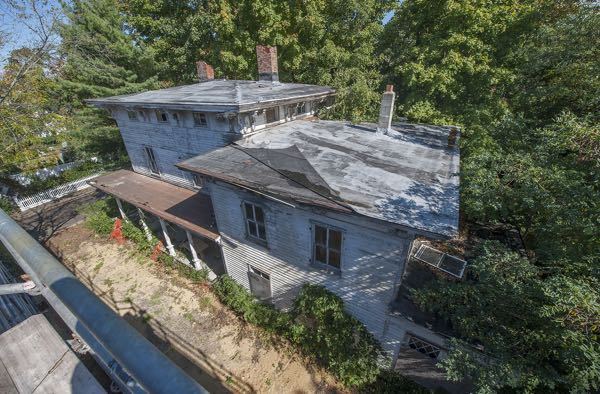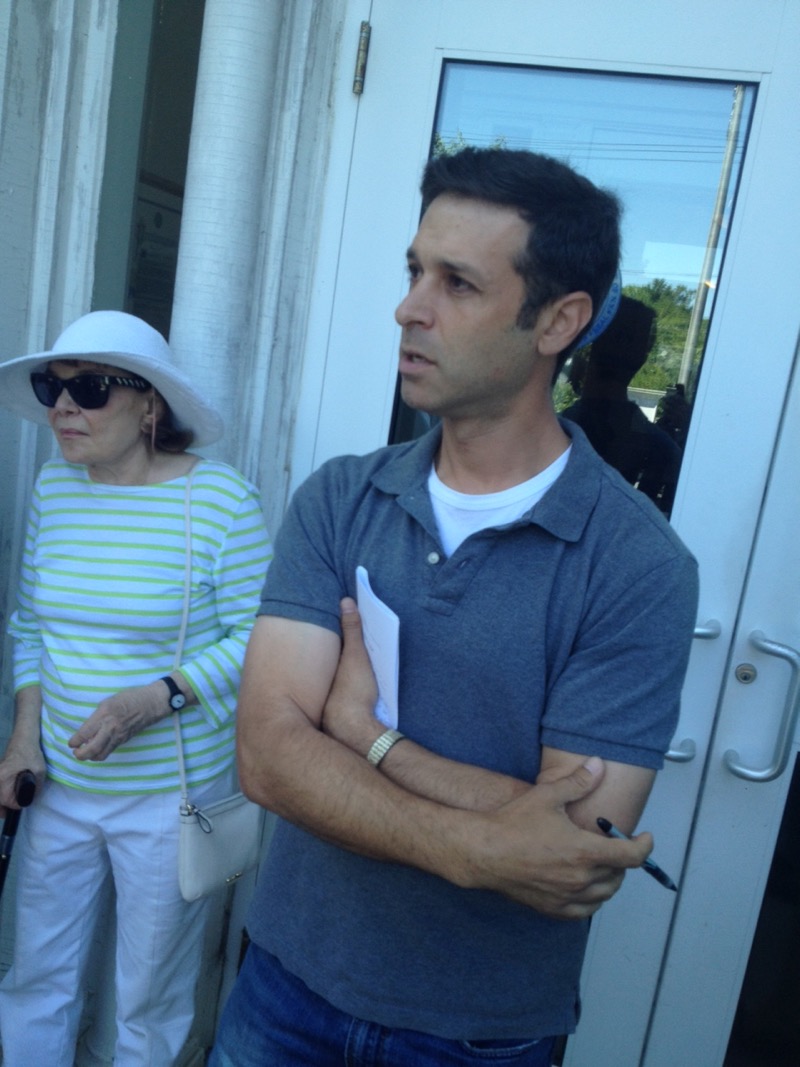
[caption id="attachment_52131" align="alignnone" width="600"] The Morpurgo House as seen from the adjacent John Jermain Memorial Library. Michael Heller photo.[/caption]
The Morpurgo House as seen from the adjacent John Jermain Memorial Library. Michael Heller photo.[/caption]
By Douglas Feiden and Michael Heller
One of the ugliest, most reviled and dangerous buildings in Sag Harbor — a threat to life and limb, long deemed unfit for human habitation and seemingly destined for the wrecking ball — just won a reprieve from demolition and a new lease on life.
An Amagansett-based developer and his California-based equity partner on Tuesday, October 25, closed on their $1.325 million purchase of the crumbling, unsafe and unsightly Morpurgo House, which was once a stately village treasure at 6 Union Street.
Mitch Winston, a 44-year old investor whose other passion is playing guitar in a group called the Band of Natural Selection, and co-owner Mark Egerman, who lives in Beverly Hills, wasted no time before securing the property with a chain-link fence — and undertaking the Herculean task of clearing out tons of debris.
Mr. Winston, whose group performs at the Stephen Talkhouse, was at the site on Friday, October 28, with three laborers who appeared to be clearing out brush and debris from a staging area near the property’s driveway off Union Street.
[caption id="attachment_52566" align="alignright" width="486"] Mitch Winston was the wining bidder of the Morpurgo House. Douglas Feiden photo.[/caption]
Mitch Winston was the wining bidder of the Morpurgo House. Douglas Feiden photo.[/caption]
The new owner of the long-abandoned house, with its grand, century-and-a-half-old architectural pedigree, was greeted with enthusiasm by neighbors and passers-by. He said people would call out to him, “Thank you! Thank you!” as he stood by the property.
Though he doesn’t anticipate that construction work will get underway until the spring of 2017, Mr. Winston reiterated his plan to restore the roughly 3,900-square-foot building to its original form. It was a pledge he had made on the morning of June 24 when he first committed to buying the house after winning a dramatic public auction on the steps of Southampton Town Hall.
“The whole intent is to try to bring back all the grandeur of the original home,” said Scott Strough, the founder of Strough Associates, which is now part of Compass, and one of the two brokers for the buyer, along with Christian Lipp, also of Compass.
“We will do that both architecturally and visually, and we may replicate some of the original elements,” Mr. Strough added. “And we will be working very, very closely with the village to adhere to all the modern fire, safety and construction codes.”
Mr. Strough said it was too earlier to offer a cost estimate for the top-to-bottom rehabilitation work the property will require, and in terms of a timetable, he said that for the “first three months or longer,” the project will be going through the village’s permitting process.
Built between 1850 and 1860, the two-and-a-half story, three-bay, Italianate-style frame residence once boasted clapboard cladding and eyebrow windows. It was operated as the Lobstein Boarding House from around 1870 into the early part of the 20th century, according to documentation provided by the National Register of Historic Places.
To assist in the ambitious restoration-and-salvage project, and to assist historians and preservationists with future research efforts, a detailed photographic record of the building’s existing interior and exterior spaces is being created, Mr. Strough said.
“Everything from the measurements of windows to masonry and preexisting beam structures will go into a photo library,” he added.
The Morpurgo House is in horrific shape at present. Basically, it’s a cross between a fire hazard, a death trap and a vermin-breeding ground, according to a series of reports and briefings prepared by Tom Preiato, the village's senior building inspector, over the past several months.
He cited unsecured holes on the east side, a gaping hole by the front entrance, a missing first floor, combustibles leaning on the structure, and a chimney that is askew and in danger of collapse:
“I don’t know if the building can even support its own weight,” Mr. Preiato said in April. “And there are deep depressions in the yard — really deep — deep enough for someone to fall into and not be seen.”
The Sag Harbor Board of Trustees had initially called for the home’s demolition on public-safety grounds, but it agreed to hold off after Mr. Winston prevailed at the auction by outbidding one of the principals of the property’s mortgage holder, who stopped at $1.25 million.
After the auction, the trustees revisited the Morpurgo issue at virtually every board meeting over the past four months, though they took no action. Still, the trustees made it abundantly clear that their patience was limited in the months that passed before Mr. Winston was finally able to close on the deal.
“I’m simply thrilled that this closing finally took place,” said Trustee Ed Deyermond, who was one of the first to sound the alarm about the building’s perilous and life-threatening conditions at multiple village board meetings. “Now, Mitch and his team can go ahead and do the right thing with this building.”
But can the village’s most derelict public-nuisance property be rescued and restored?
“Step number one is to secure the grounds with a chain-link fence, and they’ve already done that,” Mr. Deyermond said. “The house is in quite dilapidated condition, but we hope that it can be saved and restored.”
The property’s troubled history includes a decades-long fight between a pair of eccentric sisters, Anselm and Helga Morpurgo, the home’s former owners, followed by two unsuccessful court-ordered auctions, and then a third successful one, in October 2007, in which the residence was sold for $1.46 million.
It later became entangled in a mortgage fraud scheme that landed a former Suffolk County legislator in jail, and then it changed hands between a series of different investor groups amid earlier efforts to foreclose on the mortgage.
Mr. Winston, who was raised in Westchester County and graduated from the University of Pennsylvania, finally won the fourth known auction for the dwelling.
But even that was not the end of the story: A former investor who claimed an ownership stake, a Dix Hills-based woman, filed a suit in state Supreme Court in July alleging that she hadn’t been notified of the auction, and that she still retained a financial interest in the property.
A judge dismissed the claim in August, and a month or so later, when no appeal materialized, Mr. Winston was free to close the deal without title challenges or other legal hurdles.
Shortly after the closing on Tuesday, he visited his new holding to examine the site.